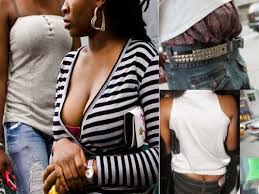National Issues
Indecent dressing or indecent behaviour, which is quintessentially more a social vice, by Odebola Taiwo James

This is a personal opinion geared towards what needs to be prioritised between the acts of indecent dressing and indecent behaviour. However, both are social vices and should be condemned. Nevertheless, what is termed indecent dressing is relative and it is not often the case as portrayed by the supposed custodian of order. As I came back after 4 years of going to live in the Asia continent before moving to Europe. The closest banker’s branch to me was in Lagos State University (LASU) campus before it was demolished for the road construction. Apart from going to the bank, during my visa process I was asked of national identification number in addition to other requirements. Advertently, the Nigerian identity management commission NIMC has a branch in LASU.
Hence, I was Privy to going to the university often for my banking activities and national identification processes. To my surprise at the gate of the university, I have been sent back once and stopped twice. Sent back for wearing crazy jeans and stopped and asked to remove my face cap. In actual fact. it was not only me same applied to students and locals who were trying to access the university gate for one purpose or the other. As there are security personnel at the gate who are more interested in bullying girls than protecting them. Therefore, I asked myself why. Taking a few minutes on social media platforms like Instagram everyday tells me. and from my little experience that the female gender, girls and ladies’ categories are naturally inclined to showcase their bodies for the purpose of, but not limited to validation’s sake, either from the male counterpart of for their personal gratification or special interest and intents. Some of them even prefer to showcase their bodies than their certificates. A shame to what our societies have come to embrace and found enticing, this is the world we are and live in now. Guys showcase illegal wealth, ladies flaunt sensitive parts of their bodies.
I am not actually against all these, I will applaud it if transformed to a constructive achievement. As I have, and present on almost all social media sites and I try to tag along, but the fact remains that intents differ. All good and better as opposed to the ex-ante situation with the social media platforms, the ex post facto now from the second decade into the millennium is that social platforms like Instagram and Facebook are now instrumental to remarkable success and achievements. I know, and I am fully aware that diverse human orientations are typical with cultures, it is relative and has relationship with territorial, geographical or demographic attitude, same with culture or behaviour of a particular people, place, region and environment which is as a result of their upbringing, surrounding, existing structures cum knowledge from birth and the environment you find yourself or grew up in. Advertently, for my first master degree, I schooled in a society and university where smoking is allowed, as it is not a smoke-free campus, and lecturers (Professors) even give 5-10 minutes break for smoking within lecture hours, but you cannot try that in Nigeria because the next day a student will come to school with marijuana, that is when territorial attitude and societal orientation come to play and place.
More importantly, the purpose of my article is about dressing and how students, particularly, female students are been treated. What is the essence of curbing their dressing if you cannot regulate their attitude towards their academics. Of what use is asking them to dress properly if it will not have much reflects on their academics. In my years of study and from my past education experience ex ante, Nigerian universities are still locked with students having exams in jam-packed halls. Waiting endlessly for results of their exams, most schools do not have portals for students to check their results or log in to make complaints and necessary contributions as touching their academic and important issues regarding their welfare on campuses. Most of them do not even have their personal student portals. However, this is posited to be changing into the second decade of the millennium.
Coming to indecent behaviour, what is the need for telling boys and girls who are university students to behave on campus by dressing properly, but when they get out of the campuses they can attempt and be subjected to rape respectively, same as harassment, prostitution, drug abuse and cultism. And the school authority does little or nothing about these. it has been proved that girls, ladies and women like to be objective in the presence of good opportunities, either they are married or not, whether you are financing her or her ambitions or she has gains from you. there is nothing much you will say, tomorrow girls will expose their bodies, you will see them in musical videos exposing vital parts of their body, they engage in standard and attitudinal prostitution as obtainable in Nigeria, they go out with men they know nothing about.
The ex post facto remains that until we begin to tell them we will reduce and subsidize their school fees, until you tell her we are giving you conditional acceptance and admission so you can access education, until we tell them you have higher chances at any employment or scholarship opportunities, until we tell them we are ready to support you with all structures so that you can succeed, This is when objectively you will see the best behaviours in them and the great cum optimal potentials embedded in them. Or how can you tell a girl that is paying N120,000 as school fees and all the parents can afford is N50,000 and she has to look for the remaining herself, how will you tell her not to do the above-mentioned vices, not until we empower them. Women are very productive until we harness that potential, a part of our development maybe lagging.
An article written and composed by Odebola Taiwo James, initiated ab initio in 2017, reviewed in 2019, and finally concluded in 2024.



























